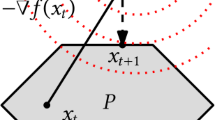Summary
We study the augmented system approach for the solution of sparse linear least-squares problems. It is well known that this method has better numerical properties than the method based on the normal equations. We use recent work by Arioli et al. (1988) to introduce error bounds and estimates for the components of the solution of the augmented system. In particular, we find that, using iterative refinement, we obtain a very robust algorithm and our estimates of the error are accurate and cheap to compute. The final error and all our error estimates are much better than the classical or Skeel's error analysis (1979) indicates. Moreover, we prove that our error estimates are independent of the row scaling of the augmented system and we analyze the influence of the Björck scaling (1967) on these estimates. We illustrate this with runs both on large-scale practical problems and contrived examples, comparing the numerical behaviour of the augmented systems approach with a code using the normal equations. These experiments show that while the augmented system approach with iterative refinement can sometimes be less efficient than the normal equations approach, it is comparable or better when the least-squares matrix has a full row, and is, in any case, much more stable and robust.
Similar content being viewed by others
References
Arioli, M., Demmel, J.W., Duff, I.S.: Solving sparse linear systems with sparse backward error. Report CSS 214, CSS Division, Harwell Laboratory, England. SIAM J. Matrix Anal. Appl. 1988 (to appear)
Bartels, R.H., Golub, G.H., Saunders, M.A.: Numerical techniques in mathematical programming. In: Rosen, J.B., Mangasarian, O.L., Ritter, K. (eds.): Nonlinear programming, pp. 123–176. New York: Academic Press 1970
Björck, Å.: Iterative refinement of linear least squares solutions. BIT7, 257–278 (1967)
Duff, I.S., Grimes, R.G., Lewis, J.G.: Sparse matrix test problems. Report CSS 191, CSS Division, Harwell Laboratory, England. ACM Trans. Math. Software 1987 (to appear)
Duff, I.S., Reid, J.K.: The multifrontal solution of indefinite sparse symmetric linear equations. ACM Trans. Math. Software9, 302–325 (1983)
Gay, D.M.: Electronic mail distribution of linear programming test problems. Mathematical Programming Society COAL Newsletter 1985
Golub, G.H., Van Loan, C.F.: Matrix computations. 1st Ed. North Oxford Academic, Oxford, and John Hopkins Press, Baltimore 1983
Hachtel, G.D.: Extended applications of the sparse tableau approach—finite elements and least squares. In: Spillers, W.R. (ed.): Basic question of design theory. Amsterdam: North Holland 1974
Hager, W.W.: Condition estimators. SIAM J. Sci. Stat. Comput.5, 311–316 (1984)
Higham, N.J.: A survey of condition number estimation for triangular matrices. SIAM Review29, 575–596 (1987)
Läuchli, P.: Jordan-Elimination und Ausgleichung nach kleinsten Quadraten. Numer. Math.3, 226–240 (1961)
Karmarkar, N.: A new polynomial time algorithm for linear programming. Combinatorica4, 373–395 (1984)
Oettli, W., Prager, W.: Compatibility of approximate solution of linear equations with given error bounds for coefficients and right-hand sides. Numer. Math.6, 405–409 (1964)
Skeel, R.D.: Scaling for numerical stability in Gaussian elimination. J. ACM26, 494–526 (1979)
Skeel, R.D.: Iterative refinement implies numerical stability for Gaussian elimination. Math. Comput.35, 817–832 (1980)
Van Loan, C.F.: On the method of weighting for equality-constrained least-squares problems. SIAM J. Numer. Anal.22, 851–864 (1985)
Author information
Authors and Affiliations
Additional information
This author was visiting Harwell and was funded by a grant from the Italian National Council of Research (CNR), Istituto di Elaborazione dell'Informazione-CNR, via S. Maria 46, I-56100 Pisa, Italy
This author was visiting Harwell from Faculty of Mathematics and Computer Science of the University of Amsterdam
Rights and permissions
About this article
Cite this article
Arioli, M., Duff, I.S. & de Rijk, P.P.M. On the augmented system approach to sparse least-squares problems. Numer. Math. 55, 667–684 (1989). https://doi.org/10.1007/BF01389335
Received:
Issue Date:
DOI: https://doi.org/10.1007/BF01389335




